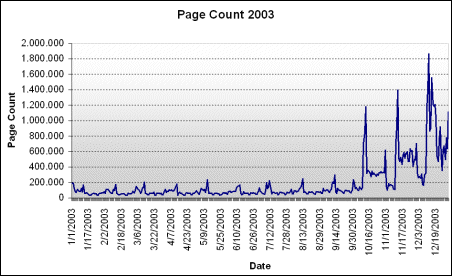Thursday, January 8, 2004
Google Page Count 2003

I automatically queried Google for all dates in 2003 (in US date format) and collected the page count. There are too many ways to write a date and the ISO way of YYYY-MM-DD is not always the most-used one. The statistic I got therefore does not differentiate between December 11 and November 12 and got peaks on those dates, naturally. However you can see there are more pages in the Google index with recent dates. Which I imagine to be either because Google deletes older pages from the index, or more likely, because they disappear from the Web naturally because of updated content.
What would also be very interesting is to have a tool tell you the peak of the year for a keyword (like Centuryshare does for the 20th century). Unfortunately one would then have to Google for phrases “January 1 2003” to “December 31 2003” which would take too long using the Google Web API.
Bruce Sterling on Google
“You get this database toxicity. You go into a system like Lexis-Nexis and you put in a search word and get 60,000 hits, and you think, this is all the knowledge there is in the universe. But its actually 10,000 references to six different things, and the actual story is something very few people know. (...)
There is a Google blindness. Its a kind of common wisdom generator, but its not necessarily going to get you to the real story of whats actually going on. (...)
[Searching skills are] a form of literacy thats really peculiar. Socrates used to talk about this: “The problem with writing is that no one memorizes the Iliad any more. Youve got to just know all of it. And how can you call yourself an educated man if you cannot recite Book Three, not missing a single epithet?” (...)
It has a profound effect on literary composition. Ive got Google up all the time. It gives you this veneer of command of the facts which you do not, in point of fact, have. Its extremely useful for novelists but somewhat dangerous if youre pretending to be a brain surgeon.”
– Bruce Sterling, Cybergreen (Interviewed by Mike Godwin, ReasonOnline), January 2004
Using Thumbnails in Search Results
Amazing possibilities if you’re creating search engines or the like [via Pandia]: the Open Thumbshots Project will let you use their thumbnails of webpages dynamically.
E.g. you can reference the following URL to show a Microsoft homepage preview:
http://open.thumbshots.org/image.pxf?url=http://www.microsoft.com
If no screenshot for the address exists, you will get an empty 1x1 image. Note that there’s a difference between including the “www” in the URL and leaving it out. For my QML Website, only a “questml.com” picture was available (no “www.questml.com”). For Microsoft, only the “www"-version is available. However this seems to be in accordance with what Google will return.
Search.CSS Now Using Thumbnails
I now included thumbnails into Search.CSS.
Other Sites Using Thumbnails
ICQsearch already uses these thumbnails for a while, and now the Open Directory Project DMOZ (on which the Google Directory is based) does the same. (But for the latter you need to click on a non-self-explanatory red ball in the bottom right to switch on thumbs.) Google still doesn’t have this option!
More sites using thumbnails:
- Boogle (thumbnails open up in new window)
- Google Filter (looks good, but in French only)
- Goossip (French only)
- Alexa
>> More posts
Advertisement
This site unofficially covers Google™ and more with some rights reserved. Join our forum!

